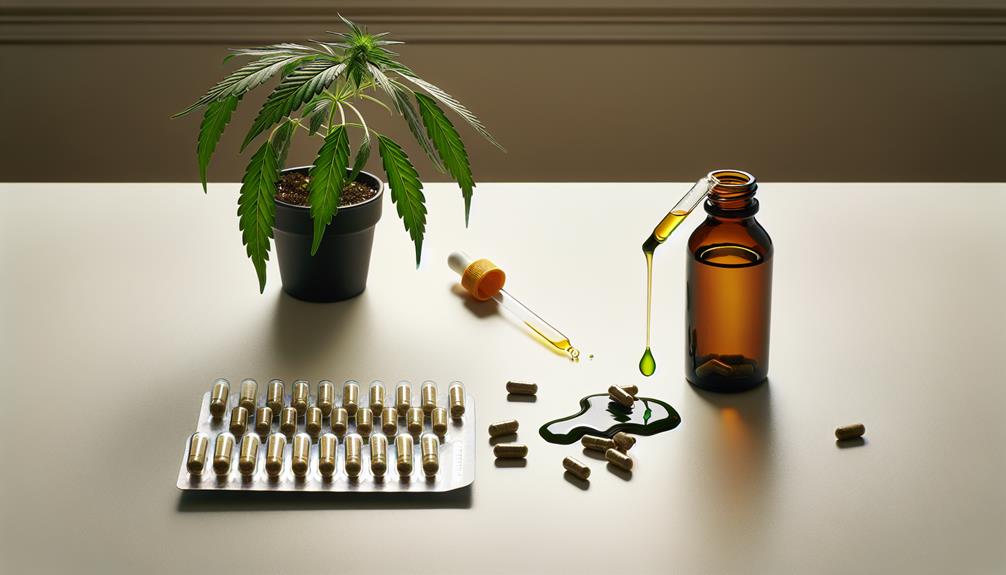When you stand at the crossroads of choosing between CBD oil and capsules, it's like deciding between a classic fountain pen and a modern ballpoint—each has its unique allure and practical application. You've likely heard the buzz around CBD, known for its potential to ease anxiety, improve sleep, and alleviate certain types of pain. CBD oil, with its versatile dosing and fast action, offers you a customizable approach to your wellness routine, allowing you to adjust your intake drop by drop. Capsules, on the other hand, present a no-fuss, no-mess alternative, with a pre-measured serving size that takes the guesswork out of dosing and can be effortlessly integrated into your daily vitamin regimen. While both forms of CBD promise the same end, the journey they take you on varies significantly—in onset, duration, and bioavailability. As you weigh your options, consider how these differences might align with your lifestyle and wellness goals. Will the swift, tailored touch of oil suit you best, or will the discreet, consistent ease of capsules fit seamlessly into your life? The answer isn't straightforward, and the nuances of each form could sway your decision in unexpected ways.
Understanding CBD Oil
CBD oil, derived from marijuana or hemp plants, offers potential health benefits through various forms like full spectrum or isolate, suited to different needs and preferences. When you're considering taking CBD oil, it's important to understand the differences between the types available. Full Spectrum CBD Products, for instance, contain a wide range of cannabinoids found in the cannabis plant, including trace amounts of THC. On the other hand, full spectrum hemp extract typically has higher levels of CBD from hemp and lower levels of THC.
Full spectrum CBD oil is often combined with a carrier oil, such as MCT oil, to enhance absorption. This type of oil provides the advantage of the "entourage effect," where the combined effect of different cannabinoids is believed to enhance the overall therapeutic benefits of cannabidiol (CBD).
The taste of CBD oil is usually described as wood-like or earthy. It's versatile, allowing for different methods of consumption and controlled dosing. The effects of taking CBD oil can last between 4-6 hours, providing a significant window of time for the potential benefits to manifest. Whether you choose a full spectrum product or an isolate, the key is to find a CBD oil that aligns with your health objectives and preferences.
Benefits of CBD Oil
Harnessing the therapeutic properties of CBD oil may alleviate symptoms of pain and inflammation, with various dosing options tailored to individual needs. The benefits of CBD oil are attributed to its interaction with the endocannabinoid system, which helps regulate balance within your body. Full spectrum CBD includes an array of cannabinoids found naturally in hemp, which may work together synergistically to enhance the potential health benefits—a phenomenon known as the entourage effect.
Here are four key points to consider:
- Versatility: CBD oil can be taken sublingually for fast absorption or added to food and beverages. Unlike capsules, you can also apply it topically to target specific areas.
- Customization: With oils, you can easily adjust your dose drop by drop, allowing for precise control over the amount you consume each day.
- Rapid Relief: When taken sublingually, CBD oil enters your bloodstream more quickly than capsules, potentially offering faster symptom relief.
- Formulation Options: Choose from full spectrum CBD for the entourage effect, broad-spectrum to avoid THC, or CBD isolate for a pure CBD experience.
Drawbacks of CBD Oil

While you may appreciate the benefits of CBD oil, you should also consider its drawbacks. The distinct taste can be off-putting, and measuring the correct dosage requires attention and precision. Furthermore, CBD oil's texture and potential for spills may present challenges, especially when you're on the go.
Taste and Texture Issues
Despite its potential benefits, many people find the wood-like or earthy taste of CBD oil off-putting, which can deter regular use. When you're considering CBD capsules vs oils, it's important to note the sensory experience:
- Taste: CBD oil often has a distinctive taste that some find unpleasant, whereas capsules are tasteless.
- Texture: Oils can leave a greasy residue, while capsules are smooth and easy to swallow.
- Convenience: Capsules eliminate the risk of spills and are more travel-friendly compared to oils.
- Preference: Choosing the best form depends on your willingness to tolerate different tastes and textures.
In understanding the difference between CBD oil and CBD capsules, consider these factors to decide how to take CBD in a way that suits you best.
Dosage Precision Challenges
Moving beyond sensory preferences, you'll also want to consider the challenges of dosing accuracy that come with using CBD oil. While you might appreciate the flexibility of CBD oil and CBD's potential benefits, the dropper of CBD oil can make it hard to get the same dose every time. It's tricky to keep track of the exact amount of CBD you're consuming, especially compared to the simplicity of CBD capsules and CBD's predetermined per capsule content.
| CBD Oil | CBD Capsules |
|---|---|
| Varied dose with each use | Consistent dose per capsule |
| Hard to track daily dose | Easy to track daily dose |
| Dropper may deliver imprecise amount | Exact amount of CBD in capsule |
| Challenging for strict dosage control | Better for strict medical regimens |
| Not ideal for precise dosing needs | Preferred for consistent daily use |
When you take CBD capsules, you bypass these issues, getting a reliable dose of CBD each time.
Overview of CBD Capsules
CBD capsules encapsulate the benefits of cannabidiol in a form that's both convenient and precisely dosed, catering to your need for a straightforward and long-lasting CBD option. Unlike the liquid form of CBD oils, Hemp CBD Capsules offer you an easy-to-take alternative that fits seamlessly into your daily vitamin routine. Full spectrum CBD capsules contain a variety of cannabinoids and terpenes, aiming to provide a more comprehensive effect.
To understand the key advantages of choosing capsules over oils, consider the following:
- Precise Dosage: Each capsule offers a specific amount of CBD, eliminating the guesswork associated with measuring oil.
- Convenience: Soft gels are discreet and portable, making them ideal for on-the-go use.
- Taste: Capsules provide a neutral taste compared to the earthy flavor of some oils.
- Absorption: Capsules enter your bloodstream after digestion, leading to a slower onset but extended duration of effects.
The difference between CBD capsules and oils lies in personal preference and lifestyle compatibility. If you're seeking a method that's simple and doesn't require dosage calculations, capsule form could be the better choice for Oil or Capsules comparisons. Choose CBD capsules for a fuss-free experience that maintains CBD's benefits in your daily life.
Advantages of CBD Capsules

You'll find that CBD capsules allow for consistent dosing, as each capsule contains a specific amount of CBD, eliminating guesswork. Their ease of use makes them a go-to for discreet and quick consumption, fitting seamlessly into your busy schedule. Moreover, the encapsulated form shields you from the earthy taste of hemp that some find unpleasant in oils.
Precise Dosage Control
When considering CBD supplementation, capsules stand out for their ability to provide exact dosages, ensuring a consistent and measurable approach to your wellness routine.
Here are some advantages of precise dosage control with CBD capsules:
- Consistent Dosage: Each capsule offers a fixed amount of CBD, eliminating the guesswork of how much CBD a full dropper of oil contains.
- Trackable: Capsules are easy to track, helping you monitor your intake and adjust as needed.
- Personalization: CBD pills cater to personal preference, allowing for adjustments in your regimen without compromising on dosage precision.
- Regulation Compliance: CBD capsules often contain less than 0.3% THC and are produced using CO2 extraction, ensuring quality and adherence to regulations.
This precision aligns with the demands of your digestive system for a steady absorption rate.
Convenient Consumption Method
While capsules ensure precise dosage, their convenience also sets them apart as they seamlessly integrate into your daily health regimen. CBD capsules are a particularly convenient consumption method if you're accustomed to taking supplements twice a day. They're easy to add to your routine and eliminate the guesswork in dosing.
Your personal preference may dictate whether you prefer to take CBD in the form of oil or capsules. Both have their merits, but for those who value discretion and ease, capsules often come out ahead. CBD supplements in capsule form cater to different needs and lifestyles, offering a flavorless and convenient option.
| Capsules | Oil |
|---|---|
| Discreet and portable | Requires measurement |
| Fixed dosage per capsule | Flexible dosing |
| Long-duration of effects | Taste can be potent |
Limitations of CBD Capsules
Despite their convenience, CBD capsules often have a slower onset of effects compared to their oil counterparts. When you're considering whether capsules are a great option for you, it's essential to keep in mind some of their limitations:
- Delayed Absorption: The capsules must pass through your stomach and liver before the pure CBD or different cannabinoids reach your bloodstream. This process can reduce the speed at which you feel the effects.
- Reduced Bioavailability: Your liver metabolizes the compounds in CBD capsules, which can decrease the amount of CBD that's available for your body to use.
- Fixed Dosage: Capsules come with a pre-measured dose of CBD, which means you have less flexibility to adjust the amount you take if your needs vary from day to day.
- Entourage Effect: If you're taking CBD isolates in capsule form, you might miss out on the potential benefits known as the entourage effect, which is more commonly found in full spectrum products that contain a variety of cannabinoids working together.
Remember that while extract CBD in capsule form has its benefits, these limitations could influence your experience and the overall effectiveness of your CBD regimen.
Comparing Bioavailability

Considering the importance of how quickly and effectively a substance enters your circulation, CBD oil typically offers higher bioavailability than capsules, resulting in more immediate and efficient absorption by your body. This means that you might feel the effects of CBD oil quicker than if you ingest capsules. However, when choosing hemp-derived CBD products, it's crucial to look for those tested by a third-party lab to ensure they're free of heavy metals and other contaminants.
Capsules, while offering convenience and precise dosing, may have lower bioavailability since they pass through the digestive system before the CBD is absorbed into the bloodstream. This process can take longer, and the amount of CBD that ends up in your circulation may be less compared to CBD oil.
| CBD Oil | Capsules |
|---|---|
| Higher bioavailability | Lower bioavailability |
| Quick absorption | Slower, digestion-dependent absorption |
| Potential for full spectrum benefits | Fixed dosage per capsule |
Always consult with a healthcare professional before starting any new supplement regimen. Researchers are still exploring the full implications of CBD bioavailability, but current understanding suggests that CBD oil might provide a more potent and rapid effect. Whether you choose oil or capsules, consider your lifestyle and health goals for the best results.
Choosing Your Ideal CBD Form
Understanding the differences in bioavailability between CBD oil and capsules can help you determine which form aligns best with your health objectives and lifestyle needs. When it comes to CBD oil vs capsules, the best option for you depends on a variety of factors. Here are four key points to consider when deciding which one is right for your personal use:
- Onset and Duration: CBD oils are absorbed more quickly, offering faster relief, but they may keep less of a presence in your system over time. Capsules, on the other hand, might take longer to kick in but can provide a sustained effect.
- Convenience and Discretion: If you're always on the go, capsules offer a discreet and easy option, as they contain less odor and are more portable than oils.
- Controlled Dosing: Oils allow for more controlled dosing, which can be important if you're trying to find the exact amount that works for you. Capsules offer a pre-measured dose, which is perfect for consistent, everyday use.
- Full Spectrum or Isolate: Consider whether you prefer a full spectrum product, which includes a variety of compounds from hemp plants, or an isolate that contains only CBD. Oils and capsules are available in both forms.
Frequently Asked Questions
Is It Better to Take CBD Capsules or Oil?
You'll consider dosage precision, bioavailability differences, and onset timing when choosing between CBD capsules or oil. Your taste preference matters—oil can have an earthy taste, whereas capsules are flavorless. Allergy considerations are crucial, as is travel convenience; capsules may edge out oil here. Assess shelf stability and cost comparison; interaction potential with other meds is also a factor. Look for full spectrum options to match your needs.
What Is the Best Form of Taking Cbd?
The best form of taking CBD depends on your needs. You'll consider CBD bioavailability, dosage precision, and taste preferences. Allergic reactions, consumption speed, and how it fits into your daily routine matter. Be mindful of substance interactions, product purity, dietary restrictions, and onset timing. There's no one-size-fits-all answer, so you'll need to weigh these factors based on your personal circumstances and health goals. Always consult a professional before starting.
Do CBD Capsules Actually Work?
Yes, CBD capsules work like a slow-burning candle, releasing their effects steadily. Capsule absorption ensures dosage precision, although bioavailability concerns may affect potency. Onset timing is slower, with digestive effects influencing the release. They're travel-friendly and boast storage stability. Taste preferences lead some to favor capsules' flavorless nature. Consider allergy considerations and ingredient interactions when choosing. Your decision should be informed by these fact-based, concise, and unbiased points.
What Are the Cons of CBD Capsules?
You might find that CBD capsules have a slower absorption rate due to the digestive process. Capsule ingestion can lead to less dosage precision and variable shelf stability. While they're portable, cost comparison might not always favor capsules. Consider the capsule composition, which could cause allergic reactions, and note the flavor absence, which you might miss. These factors can make capsules less appealing compared to other forms of CBD.
